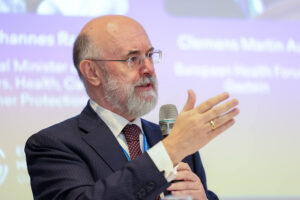Clemens Martin Auer, President of the European Health Forum Gastein, talks to us in an interview about the main theme of the European Health Forum Gastein 2024 and how investing in healthcare can help to counter the current threat to democracies.
Interview: Dietmar Schobel
HEALTHY EUROPE
President Auer, this year the European Health Forum Gastein is taking place for the 27th time. How has it evolved since its earliest days?
Clemens Martin Auer: The European Health Forum Gastein is an international conference where representatives from all four pillars of society – i.e. from the public sector, private sector, civil society, and science and academia – come together. This set us apart from the very beginning and continues to do so today. And we have never shied away from tackling “hot topics”, such as equitable access to healthcare and medicines for all citizens and states, regulating cross-border healthcare, and Europe’s role in global healthcare policy.
HEALTHY EUROPE
“Shifting sands of health – democracy, demographics, digitalisation” has been selected as this year’s main theme. What was the reason behind this choice?
Clemens Martin Auer: The threat to democracy and its institutions and to the rule of law in general in some European countries is currently the most socially relevant and highly charged issue of them all. In many states, inflation and housing shortages have led to a situation where the cost of living has become increasingly unaffordable for large sections of the population. As a result, more and more people are becoming dissatisfied with democratic institutions and the role they are playing. Right- and left-wing populists seize upon this dissatisfaction – but without offering sustainable solutions to the complex problems at the root of this dissatisfaction. The middle class needs to counter this and spearhead a solution-oriented discussion. As Europe’s most important conference on health policy, the European Health Forum Gastein can and should make its voice heard here as well.
By strengthening health systems we are automatically strengthening democracy and its institutions.
CLEMENS MARTIN AUER, PRESIDENT OF THE EHFG
HEALTHY EUROPE
What does this development mean for our health systems?

Clemens Martin Auer: By strengthening health systems we are automatically strengthening democracy and its institutions. In democratic states with mutually supportive health and social systems, people can rightly expect the health system to provide the services that they require if the situation arises. Moving towards a situation where we have second- or even third-class medicine is not conducive to this. Therefore, public health professionals should do even more to ensure that spending money on healthcare is seen as an investment rather than expenditure. Having good arguments for better healthcare will become even more important in the coming years. After all, the competition between the various sectors for a part of the dwindling public purse is set to further intensify.
HEALTHY EUROPE
Why will the European Health Forum Gastein 2024 also be focussing on digitalisation and demographic change?
Clemens Martin Auer: Regarding digitalisation, recent years have shown how democratic processes have shifted our focus from solely data protection to prioritising patients’ right to have their data used effectively to improve healthcare quality. And the changing age structure in Europe is producing substantial challenges for the healthcare sector. While the supply of qualified staff is shrinking, the demand for care is rising. This problem can only be solved by the younger and older generations working alongside one another. We need to find joint European solutions that harness the potential of digital tools and migration, particularly labour migration, while also considering the legitimate concerns of people with migrant backgrounds.
Clemens Martin Auer was born in 1957. From 2005 to 2018 he was head of the department responsible for the health service and central coordination in the Austrian Federal Ministry of Health. He has been President of the European Health Forum Gastein since 2017.
ABOUT THE EUROPEAN HEALTH FORUM GASTEIN
The European Health Forum Gastein (EHFG) was founded in 1998 as a European health policy conference. It aims to provide a platform for all stakeholders from the fields of public health and beyond. Over the past 26 years, the EHFG has established itself as an indispensable institution in the scope of European health policy. With its annual conference and other events and projects, it has made a decisive contribution to the development of guidelines and above all the cross-border exchange of experience, information and cooperation. Leading European experts traditionally participate in the annual conference held in the Gastein Valley in the Austrian Alps in late September.
